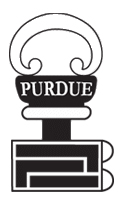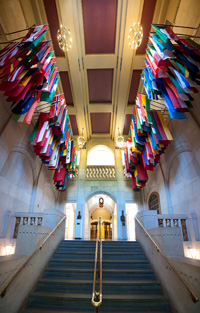Giving to Purdue
University Development Office

Service Without Recognition A Hallmark At Purdue
 What
do the Unfinished Block “P” statue, Freedom Square, a leadership
development challenge course and the International Flags display in the
Purdue Memorial Union have in common? Each is a symbol of service to
others performed without the need for recognition.
What
do the Unfinished Block “P” statue, Freedom Square, a leadership
development challenge course and the International Flags display in the
Purdue Memorial Union have in common? Each is a symbol of service to
others performed without the need for recognition.
We’ve all likely seen or heard of these things, but probably never stopped to consider how they came to be or wondered about the inspiration behind them. In fact, the only ones who do know these things are members of the secret society who conceived, funded and delivered each project.
Since its inception in 1910, the purpose of membership in one secret philanthropic student honorary society at Purdue, The Order of the Iron Key, has been for each class to learn how to use leadership as a means to help others instead of as a way to gain personally.
Class project work under the guidance of Dr. L. Tony Hawkins, associate vice president for student affairs, and former dean of students and Iron Key advisor took on a more meaningful purpose when he charged members with developing ideas to accent the Purdue student experience or the University in general. This self-funded group, each student a well-established leader in his or her own right, works to leave Purdue a better place than when they arrived.
“Students have to find the resources for their project,” explains Hawkins. All have been a concept that resonated in some way with the classes that they were able to secure what was needed. “There were challenges along the way but the one constant that kept all of us going, always, was the students and their eagerness to accomplish their goal and learn in the process.”

Price tags for projects have varied from $10,000 to over $100,000. But, unlike other student organizations, Iron Key depends on their alumni, other student groups that “buy” into the concepts, Iron Key family members and friends to fund the classes and their projects, and in some cases corporations made monetary donations, or donated labor and materials. Without question, all projects completed by Iron Key classes will impact our great university for generations to come.
Equally as poignant as the projects are the relationships gained and lessons learned – things the students will carry with them long after the tassel is turned and the cap and gown are put away.
When he moved out of his role as dean of students and into his new one as associate vice president for student affairs, Hawkins also stepped aside as the group’s advisor. It was then that a group of alumni decided they wanted to do something significant to thank him for his thoughtful and generous leadership.
As a way to honor Hawkins for his example of service without credit, two alumni captained an endeavor to create an endowment in his name that will help sustain the legacy of the Iron Key program. The endowment will help fund future class projects and keep the organization operating.
All Iron Key honorary alumni and the classes Hawkins advised were asked to make a gift to create this endowment. More than sixty-seven donors – almost all of them young alumni – have committed over $30,000.
In a time when it would be easy to put their money toward other things, these young philanthropists chose to continue on the service to others path they walked as students. They joined together to honor someone in an area that meant so much to them. Someone, who, like them, is always giving to others.
The group revealed this project to Hawkins during the Purdue Iron Key Homecoming Breakfast on October 22, 2011, where he was presented with a plaque commemorating the honor. "I was surprised and humbled," Hawkins said. "It’s really the Iron Key endowment, not the L. Tony Hawkins Iron Key Endowment.”
Although he denies doing anything except steering and asking a few questions, Dr. L. Tony Hawkins, the man who was an example and inspiration to thirteen years of Iron Key classes, humbly states: "I really didn't do anything. I was the coxswain; they did all the hard rowing. It was their leadership, their hard work, their creativity."
Once again, giving credit to someone else. What else would you expect from the advisor and the students of an organization whose purpose is to serve others from the shadows of humility?
Editor’s note:
Dr. L. Tony Hawkins came to Purdue in 1973 as a Ph.D student and after receiving his degree in 1979, decided to stay. Loving the atmosphere, the goal-directed students and a woman named Joyce, he made this his home. Thanks for giving ‘em “L” Tony!

